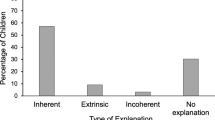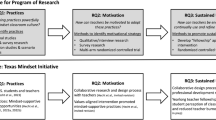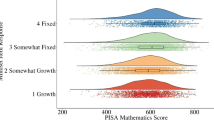Abstract
In many societies, beliefs about differential intellectual ability by gender persist across generations. These societal beliefs can contribute to individual belief formation and thus lead to persistent gender inequality across multiple dimensions. We show evidence of intergenerational transmission of gender norms through peers and how this affects gender gaps in learning. We use nationally representative data from China and the random assignment of children to middle-school classrooms to estimate the effect of being assigned a peer group with a high proportion of parents who believe that boys are innately better than girls at learning mathematics. We find this increases a child’s likelihood of holding the belief, with greater effects from peers of the same gender. It also affects the child’s demonstrated mathematics ability, generating gains for boys and losses for girls. Our findings highlight how the informational environment in which children grow up can shape their beliefs and academic ability.
This is a preview of subscription content, access via your institution
Access options
Access Nature and 54 other Nature Portfolio journals
Get Nature+, our best-value online-access subscription
$29.99 / 30 days
cancel any time
Subscribe to this journal
Receive 12 digital issues and online access to articles
$119.00 per year
only $9.92 per issue
Buy this article
- Purchase on Springer Link
- Instant access to full article PDF
Prices may be subject to local taxes which are calculated during checkout


Similar content being viewed by others
Data availability
Our data are publicly available at the CEPS website, hosted by Renmin University of China, from which we accessed them: http://ceps.ruc.edu.cn/English/Overview/Overview.htm. This repository contains the entire ‘minimum dataset’ necessary to interpret, verify and extend the research in the article.
Code availability
Custom code that supports the findings of this study is available on the GitHub public repository at https://github.com/alexeble/NHBGenderedbeliefs2022/.
References
Kovács, Á. M., Téglás, E. & Endress, A. D. The social sense: susceptibility to others’ beliefs in human infants and adults. Science 330, 1830–1834 (2010).
Frith, C. D. & Frith, U. Mechanisms of social cognition. Annu. Rev. Psychol. 63, 287–313 (2012).
Jayachandran, S. The roots of gender inequality in developing countries. Annu. Rev. Econ. 7, 63–88 (2015).
Beilock, S. L., Gunderson, E. A., Ramirez, G. & Levine, S. C. Female teachers’ math anxiety affects girls’ math achievement. Proc. Natl Acad. Sci. USA 107, 1860–1863 (2010).
Tsui, M. Gender and mathematics achievement in China and the United States. Gend. Issues 24, 12 (2007).
Eble, A. & Hu, F. Child beliefs, societal beliefs, and teacher-student identity match. Econ. Educ. Rev. 77, 101994 (2020).
Nollenberger, N., Rodríguez-Planas, N. & Sevilla, A. The math gender gap: the role of culture. Am. Econ. Rev. 106, 257–261 (2016).
Bian, L., Leslie, S.-J. & Cimpian, A. Gender stereotypes about intellectual ability emerge early and influence children’s interests. Science 355, 389–391 (2017).
Steele, C. M. A threat in the air: how stereotypes shape intellectual identity and performance. Am. Psychol. 52, 613–629 (1997).
Olivetti, C., Patacchini, E. & Zenou, Y. Mothers, peers, and gender-role identity. J. Eur. Econ. Assoc. 18, 266–301 (2020).
Su, R. & Rounds, J. All STEM fields are not created equal: people and things interests explain gender disparities across STEM fields. Front. Psychol. 6, 189 (2015).
Lucas, C. G., Bridgers, S., Griffiths, T. L. & Gopnik, A. When children are better (or at least more open-minded) learners than adults: developmental differences in learning the forms of causal relationships. Cognition 131, 284–299 (2014).
Gopnik, A., Griffiths, T. L. & Lucas, C. G. When younger learners can be better (or at least more open-minded) than older ones. Curr. Dir. Psychol. Sci. 24, 87–92 (2015).
Gopnik, A. et al. Changes in cognitive flexibility and hypothesis search across human life history from childhood to adolescence to adulthood. Proc. Natl Acad. Sci. USA 114, 7892–7899 (2017).
Blanco, N. J. & Sloutsky, V. M. Systematic exploration and uncertainty dominate young children’s choices. Dev. Sci. 24, e13026 (2021).
Goldin, C. Understanding the Gender Gap: An Economic History of American Women (Oxford Univ. Press, 1990).
Fernández, R., Fogli, A. & Olivetti, C. Mothers and sons: preference formation and female labor force dynamics. Q. J. Econ. 119, 1249–1299 (2004).
Dhar, D., Jain, T. & Jayachandran, S. Intergenerational transmission of gender attitudes: evidence from India. J. Dev. Stud. 55, 2572–2592 (2019).
Rodríguez-Planas, N. & Nollenberger, N. Let the girls learn! It is not only about math… it’s about gender social norms. Econ. Educ. Rev. 62, 230–253 (2018).
Math Course Requirements during Compulsory Education 2011 version (Ministry of Education of the People’s Republic of China, 2011).
Siegler, R. S. Emerging Minds: The Process of Change in Children’s Thinking (Oxford Univ. Press, 1998).
Sacerdote, B. in Handbook of the Economics of Education Vol. 3 (eds Hanushek, E. A. et al.) 249–277 (Elsevier, 2011).
Feld, J. & Zölitz, U. Understanding peer effects: on the nature, estimation, and channels of peer effects. J. Labor Econ. 35, 387–428 (2017).
Hu, F. Do girl peers improve your academic performance? Econ. Lett. 137, 54–58 (2015).
Fruehwirth, J. C. & Gagete-Miranda, J. Your peers’ parents: spillovers from parental education. Econ. Educ. Rev. 73, 101910 (2019).
Carrell, S. E., Page, M. E. & West, J. E. Sex and science: how professor gender perpetuates the gender gap. Q. J. Econ. 125, 1101–1144 (2010).
Steffens, M. C. & Jelenec, P. Separating implicit gender stereotypes regarding math and language: implicit ability stereotypes are self-serving for boys and men, but not for girls and women. Sex Roles 64, 324–335 (2011).
Cheryan, S. Understanding the paradox in math-related fields: why do some gender gaps remain while others do not? Sex Roles 66, 184–190 (2012).
Feld, S. L. The focused organization of social ties. Am. J. Sociol. 86, 1015–1035 (1981).
McPherson, M., Smith-Lovin, L. & Cook, J. M. Birds of a feather: homophily in social networks. Annu. Rev. Socio. 27, 415–444 (2001).
Currarini, S., Jackson, M. O. & Pin, P. An economic model of friendship: homophily, minorities, and segregation. Econometrica 77, 1003–1045 (2009).
Steele, C. M. & Aronson, J. Stereotype threat and the intellectual test performance of African Americans. J. Pers. Soc. Psychol. 69, 797–811 (1995).
Niederle, M. & Vesterlund, L. Gender and competition. Annu. Rev. Econ. 3, 601–630 (2011).
Saccardo, S., Pietrasz, A. & Gneezy, U. On the size of the gender difference in competitiveness. Manag. Sci. 64, 1541–1554 (2018).
Cai, X., Lu, Y., Pan, J. & Zhong, S. Gender gap under pressure: evidence from China’s national college entrance examination. Rev. Econ. Stat. 101, 249–263 (2019).
Angrist, J. D. The perils of peer effects. Labour Econ. 30, 98–108 (2014).
Snowberg, E., Wolfers, J. & Zitzewitz, E. in Handbook of Economic Forecasting Vol. 2 (eds Elliott, G. & Timmermann, A.) 657–687 (North Holland, 2013).
Fair, R. C. & Shiller, R. J. Comparing information in forecasts from econometric models. Am. Econ. Rev. 80, 375–389 (1990).
Manski, C. F. Identification of endogenous social effects: the reflection problem. Rev. Econ. Stud. 60, 531–542 (1993).
Siegler, R. S., DeLoache, J. S. & Eisenberg, N. How Children Develop (Macmillan, 2003).
Piaget, J. The Origins of Intelligence in Children (W W Norton & Co, 1952).
Shafer, E. F. & Malhotra, N. The effect of a child’s sex on support for traditional gender roles. Soc. Forces 90, 209–222 (2011).
Baxter, J., Buchler, S., Perales, F. & Western, M. A life-changing event: first births and men’s and women’s attitudes to mothering and gender divisions of labor. Soc. Forces 93, 989–1014 (2015).
Perales, F., Jarallah, Y. & Baxter, J. Men’s and women’s gender-role attitudes across the transition to parenthood: accounting for child’s gender. Soc. Forces 97, 251–276 (2018).
Sun, X. & Lai, K. Are mothers of sons more traditional? The influence of having son(s) and daughter(s) on parents’ gender ideology. J. Chin. Sociol. 4, 1 (2017).
Angrist, J. D. & Pischke, J.-S. The credibility revolution in empirical economics: how better research design Is taking the con out of econometrics. J. Econ. Perspect. 24, 3–30 (2010).
Liu, T., Ungar, L. & Kording, K. Quantifying causality in data science with quasi-experiments. Nat. Comput. Sci. 1, 24–32 (2021).
Ammermueller, A. & Pischke, J.-S. Peer effects in European primary schools: evidence from the progress in international reading literacy study. J. Labor Econ. 27, 315–348 (2009).
Hill, A. J. The positive influence of female college students on their male peers. Labour Econ. 44, 151–160 (2017).
Chung, B. W. Peers’ parents and educational attainment: the exposure effect. Labour Econ. 64, 101812 (2020).
Wang, H., Cheng, Z. & Smyth, R. Do migrant students affect local students’ academic achievements in urban China? Econ. Educ. Rev. 63, 64–77 (2018).
Qian, N. Missing women and the price of tea in China: the effect of sex-specific earnings on sex imbalance. Q. J. Econ. 123, 1251–1285 (2008).
Kipnis, A. B. Governing Educational Desire: Culture, Politics, and Schooling in China (Univ. Chicago Press, 2011).
Chen, X. & Ge, S. Social norms and female labor force participation in urban China. J. Comp. Econ. 46, 966–987 (2018).
Jensen, R. & Oster, E. The power of TV: cable television and women’s status in India. Q. J. Econ. 124, 1057–1094 (2009).
Gong, J., Lu, Y. & Song, H. The effect of teacher gender on students’ academic and noncognitive outcomes. J. Labor Econ. 36, 743–778 (2018).
Antecol, H., Eren, O. & Ozbeklik, S. The effect of teacher gender on student achievement in primary school. J. Labor Econ. 33, 63–89 (2015).
Bruhn, M. & McKenzie, D. In pursuit of balance: randomization in practice in development field experiments. Am. Econ. J. Appl. Econ. 1, 200–232 (2009).
Hansen, B. B. & Bowers, J. Covariate balance in simple, stratified and clustered comparative studies. Stat. Sci. 23, 219–236 (2008).
Li, X. & Lamb, M. E. in Fathers in Cultural Context (eds Shwalb, D. W. et al.) 15–41 (Routledge/Taylor & Francis, 2013).
Dobbie, W. & Fryer, R. G. Jr The impact of attending a school with high-achieving peers: evidence from the New York City exam schools. Am. Econ J. Appl. Econ. 6, 58–75 (2014).
Acknowledgements
We are grateful to seminar audiences at Columbia, the Federal Reserve Bank of New York, the Northeastern Universities Development Consortium, Northwestern, Queens College, Rutgers, Texas A&M and UT Austin. We are also grateful to M. Angelucci, P. Bergman, P. Blair, B. Cheble, S. Cohodes, J. Das, J. Doleac, A. Estefan, M. Hoekstra, W. Huang, J. Keller, L. Linden, J. Lindo, R. Lumsdaine, J. Matsudaira, J. Meer, K. Pop-Eleches, R. Reback, J. Rockoff, J. Scott-Clayton, M. Urquiola and T. Vogl for helpful comments. This paper replaces and updates the results previously circulated as a working paper under the titles: ‘How important are beliefs about gender differences in math ability? Transmission across generations and impacts on child outcomes’ and ‘The sins of the parents: persistence of gender bias across generations and the gender gap in math performance’. We acknowledge the following sources of support: The Humanities and Social Science Fund of Ministry of Education of China (grant no. 19YJA790029) and the National Natural Science Foundation of China (grant no. 71373002) to F.H.; National Academy of Education and Spencer Foundation via an NAEd/Spencer Postdoctoral Fellowship (no grant number) to A.E. The funders had no role in study design, data collection and analysis, decision to publish or preparation of the manuscript.
Author information
Authors and Affiliations
Contributions
A.E. and F.H. contributed equally to all stages of the research and to preparation of the manuscript and are listed alphabetically.
Corresponding authors
Ethics declarations
Competing interests
The authors declare no competing interests.
Peer review
Peer review information
Nature Human Behaviour thanks Lin Bian, David Figlio and the other, anonymous, reviewer(s) for their contribution to the peer review of this work. Peer reviewer reports are available.
Additional information
Publisher’s note Springer Nature remains neutral with regard to jurisdictional claims in published maps and institutional affiliations.
Supplementary information
Rights and permissions
About this article
Cite this article
Eble, A., Hu, F. Gendered beliefs about mathematics ability transmit across generations through children’s peers. Nat Hum Behav 6, 868–879 (2022). https://doi.org/10.1038/s41562-022-01331-9
Received:
Accepted:
Published:
Issue Date:
DOI: https://doi.org/10.1038/s41562-022-01331-9



